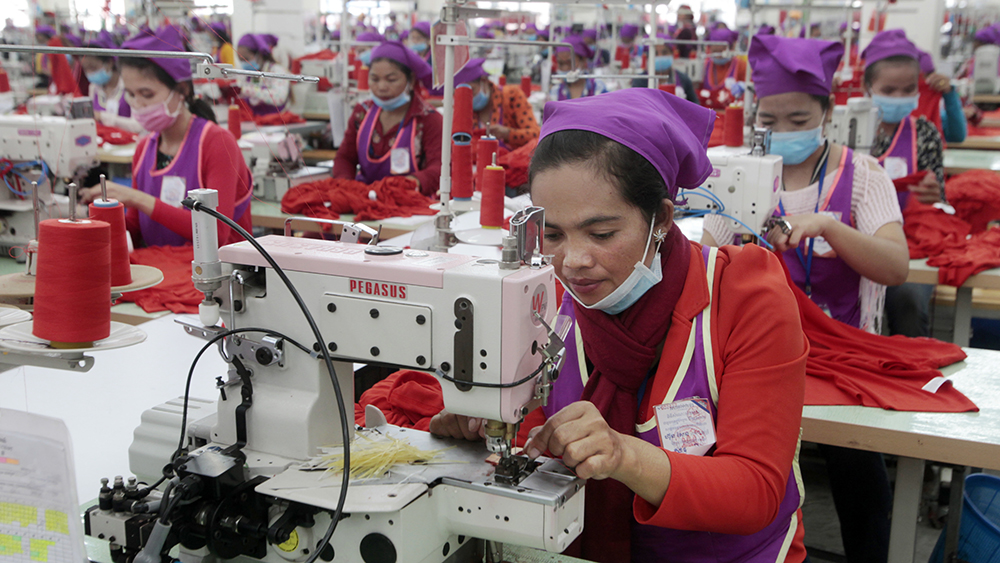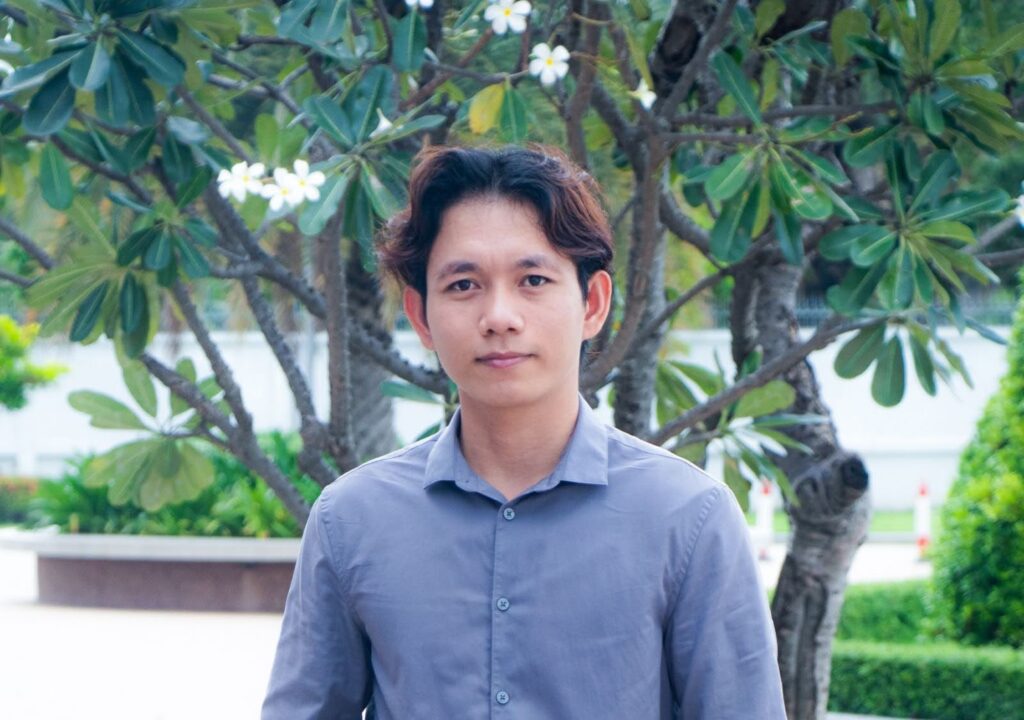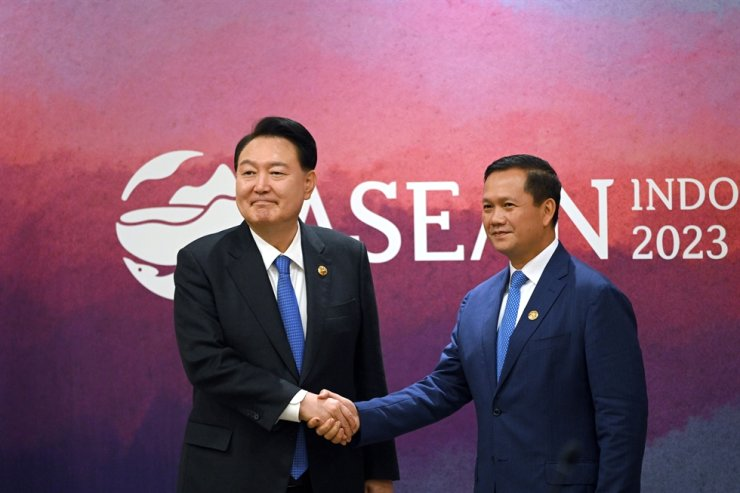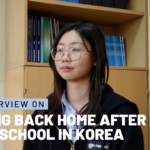In November 2022, South Korean President Yoon Suk-yeol visited Cambodia for the first time to participate in the Association of Southeast Asian Nations (ASEAN) Summit in Phnom Penh. Shortly after his arrival, Yoon announced the Korea-ASEAN Solidarity Initiative (KASI), as part of South Korea’s new Indo-Pacific Strategy. The underlying motive of the KASI is to strengthen South Korea’s bilateral relations with ASEAN countries and broaden its Indo-Pacific strategy in the region.
The 2022 announcement of the KASI in Phnom Penh showed the significance of Cambodia as part of South Korea’s approach to the ASEAN region.
On the sidelines of the 2022 ASEAN summit, Yoon and former Cambodian Prime Minister Hun Sen discussed “regional and global issues such as trade agreements and bilateral cooperation. Yoon also expressed his willingness to support ASEAN centrality and strengthen relations with Cambodia. Yoon seemed to follow the footsteps of former South Korean President Moon Jae-in, whose foreign policy approach involved strengthening relations with Cambodia.
Followingly the invitation by President Yoon, on March 15, 2024, Cambodia Prime Minister Hun Manet announced that he will soon visit South Korea. While trade relations are likely to be included in the agenda, it is expected that the bilateral meeting will elevate the bilateral relations between the two countries.
Cambodia under the China’s influence
According to Cambodian political analysts, Cambodia’s foreign policy has been perceived as “China’s proxy for decades,” as Cambodia has offered diplomatic support to China on regional and global issues. This can be exemplified by the case of the South China Sea issue and One-China policy.
Cambodia’s fixed stance on the South China Sea issue entails its commitment to support a bilateral approach between member states of the ASEAN and China.
Cambodia’s South China Sea stance is strongly favored by China, while claimant states in Southeast Asia prefer multilateralism. Cambodia demonstrated this position in 2012 by opposing the ASEAN communique mentioning the ruling of the International Court of Justice (ICJ) against China. The court did not acknowledge China’s sweeping claim in the SCS. Cambodia also expressed its unreserved support for China regarding the Taiwan cross-strait issue. In January 2024, Cambodia’s Ministry of Foreign Affairs issued a statement reiterating its “resolute adherence” to the One-China policy, where Cambodia recognized only mainland China as the legitimate authority of China.
Nevertheless, other ASEAN states have reservations toward the One-China policy. Yet, Cambodia expressed full diplomatic support for China following the win of the Democratic Progressive Party (DPP) in Taiwan’s presidential election. The DPP’s victory prompted a response from China as the party sought to deepen ties between Taipei and Washington.
Cambodia’s unequivocal support to China is due to the mutual and reciprocated interest between the two countries. China is Cambodia’s top bilateral donor, investor, and trade partner. More importantly, China has increased its footprint in Cambodia recently through its involvement in many key development projects in Cambodia. The outstanding projects among those are the Phnom Penh-Sihanoukville Expressway and Funan Techo Canal. Currently, China invested more than a billion dollars to develop Cambodia’s infrastructure under the Build-Operate-Transfer model, which allows Chinese state-owned companies to manage Cambodia’s critical infrastructure for over 50 years.
In 2021, Hun Sen famously said “If I don’t rely on China, who will I rely on?” This statement only further implied that only China had the willingness to help Cambodia.
However, it is not without risk to rely too much on one country. Chinese influence in Cambodia could enhance Cambodia’s asymmetrical economic interdependence with China. Cambodia depends on China to sustain its economic growth.

Cambodia’s garment industry was particularly affected by the COVID-19 pandemic. Source: AP
This can be exemplified by the case of COVID-19. The pandemic led to the restriction of trade flow among countries. Cambodia’s garment sector suffered a fatal blow as China could not supply raw material to Cambodia. Similarly, the pandemic led some Chinese investors to withdraw from their development project in Cambodia, which can be seen in the case of the 300-hectare airport in Modulkiri. Now, the construction remains stalled as Cambodia can not find new investors. This economic dependency can be translated into political influence which persuades Cambodia to support China on its regional and international issues including the South China Sea issue and the Cross-strait issue.
Cambodia’s effort to diversify the relations
The current Cambodian Prime Minister Hun Manet is well aware that over-reliance on one big power is not a smart foreign policy option, as past tragedies from the Cold War remain vividly in the minds of Cambodian senior leaders. Cambodia fell into a genocidal Khmer Rouge regime and Civil war, which killed around 3 million Cambodian people. Against this backdrop, the Cambodian government has put effort to strengthen relations with other middle and major powers such as South Korea, Japan, Australia, and the United States.
South Korea is demonstrating both its capability and willingness to engage with Cambodia. Following the announcement of the KASI, South Korean investment and assistance has increased in the Kingdom. For instance, it was revealed by the National Bank of Cambodia that South Korea’s foreign direct investment (FDI) reached US $ 5.467 billion in the first three months of 2023, which makes South Korea Cambodia’s second largest investor, only behind China. The enforcement of the Cambodia-Korea Free Trade Agreement (FTA) in December 2022 only further enhanced the trade relations between the two countries.
Currently, Cambodia only has FTAs with China and South Korea. In April 2022, then Secretary General Sok Chenda Sophea (now the Minister of Foreign Affairs of Cambodia) of the Council for the Development of Cambodia (CDC), highlighted South Korea’s contribution to Cambodia’s development and expressed optimism for the future relations between the two countries. The CDC is a body responsible for foreign investments in the Kingdom.
South Korea is among Cambodia’s top donors, with notable contributions to Cambodia’s infrastructure and socio-economic development. In 2022, the South Korean government loaned US$1.5 billion to the Cambodian government, to be used mainly for electricity infrastructure improvement and bridge construction in Phnom Penh, the capital city of Cambodia.
In 2023, the South Korean government also pledged US$23.22 million to Cambodia to support education, culture, rural development, agriculture, demining, and the environment. From 1989 to 2021, South Korea has provided more than US$1 billion in official development assistance (ODA) for Cambodia’s socio-economic development. Despite South Korea’s economic relations and assistance to Cambodia being relatively small compared to China, the number is increasing as relations between the two countries continue to become stronger.
South Korea’s engagement with Cambodia is strongly welcomed by the Cambodian government as it is an opportunity for Cambodia to reduce its reliance on China. In September 2023, during a meeting with the Speaker of the South Korean National Assembly Kim Jin-pyo, Hun Manet expressed his desire to improve the ties between the two countries to the level of “comprehensive strategic partnership,” which is the highest level of Cambodia’s foreign relations. This could make it possible to strengthen the military, economic, and people ties between the two countries. The increasing South Korean support and engagement with Cambodia will enable the Cambodian government to diversify and reduce its over-reliance on China.
In comparison to China, South Korea’s engagement with Cambodia is strongly welcomed by the Cambodian government and its people. Essentially, South Korea is a democratic country. Its engagement with Cambodia will in some way help Cambodia achieve its full form of democratic practices.
Many analysts and experts perceive that China’s involvement in Cambodia fostered corruption and the patron-client system, both of which could ultimately underpin Cambodian democracy. In an analysis published by the East Asia Forum, Cambodian researchers cites “China’s unquestioning approach to how its aid and investment money is distributed” as one of a factor in “exacerbated corruption, deteriorated good governance and human rights,” while also ruining Cambodia’s “resources and natural environment.”
Furthermore, South Korea’s soft power has strongly increased in Cambodia in the form of K-pop, Korean movies, Korean cuisine, and movies. Though it is a non-political field, it could set a strong foundation for future relations between the two countries. However, China’s image has gained a notorious reputation following the increase of Chinese scammers and online-fraud in Cambodia.

The coastal city of Sihanoukville is home to a host of Chinese casinos and hotels. Source: Nikkei Asia
A report from international Geneva-based NGO Global Initiative Against Transnational Organized Crime cites the Cambodian city of Sihanoukville as a hub for transnational organized crime. The city is home to several Chinese-run casinos, establishments, and has become a “focal point” for Chinese investors.
“Sihanoukville has also recently become a centre of transnational human trafficking committed by Chinese organized gangs. These illicit activities have tarnished the image of Cambodia and China, and by extension, the BRR — throughout Southeast Asia and Beyond,” a commentary from Cambodian analysts published in the ISEAS-supported publication Fulcrum reads.
A survey published by the Singaporean think tank ISEAS Yusof Ishak Institute in 2022 revealed that there is high social tension between Cambodians and New Chinese in Cambodia is rated 45 percent (high) and 14 percent (very high).
Overall, the strengthening of bilateral relations between the two countries, proved to be significant for both Cambodia and South Korea. Seoul will be able to project its influence and soft power in the region while Cambodia can diversify its relations with middle and big powers. However, this is easier said than done, and it will take the commitment and active effort from the two countries’ governments to strengthen and foster the relations.
 Rim Sokvy is a Research Fellow at the Cambodian Center for Regional Studies. His research interests focus on Cambodia’s foreign policy and its engagement with ASEAN and East Asian countries.
Rim Sokvy is a Research Fellow at the Cambodian Center for Regional Studies. His research interests focus on Cambodia’s foreign policy and its engagement with ASEAN and East Asian countries.
- English Fever in South Korea - February 24, 2025
- South Korea’s Medical School Expansion – Cure Worse than the Disease? - October 20, 2024
- Cambodia’s Balancing Act: South Korea’s role and China’s influence - June 10, 2024






